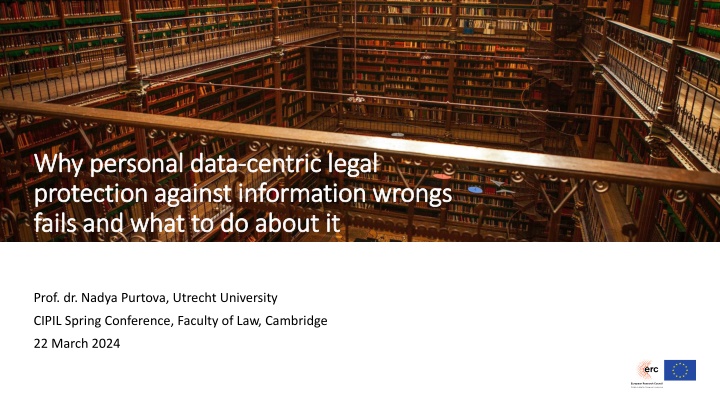
Legal Protection Challenges for Personal Data-Centric Approach
Explore why legal protection for personal data-centric approaches fails and learn what steps can be taken to address the issues. Issues such as overinclusiveness, underinclusiveness, and the quality of legal protection are discussed, along with suggestions for improvement.
Download Presentation

Please find below an Image/Link to download the presentation.
The content on the website is provided AS IS for your information and personal use only. It may not be sold, licensed, or shared on other websites without obtaining consent from the author. If you encounter any issues during the download, it is possible that the publisher has removed the file from their server.
You are allowed to download the files provided on this website for personal or commercial use, subject to the condition that they are used lawfully. All files are the property of their respective owners.
The content on the website is provided AS IS for your information and personal use only. It may not be sold, licensed, or shared on other websites without obtaining consent from the author.
E N D
Presentation Transcript
Why personal data Why personal data- -centric legal protection against information wrongs protection against information wrongs fails and what to do about it fails and what to do about it centric legal Prof. dr. Nadya Purtova, Utrecht University CIPIL Spring Conference, Faculty of Law, Cambridge 22 March 2024
ERC Info-Leg team
Personal data is a trigger concept of European data protection law.
Problems of personal data-centric legal protection Overinclusiveness Underinclusiveness Quality of law / regulatory precision
Overinclusiveness: on the one hand, GDPR as a defence against the dark arts
Overinclusiveness: on the other, law of everything Everything is personal data Everyone is a controller Intensive compliance System overload , or bad law (Fuller).
AG Bobek: The GDPR is gradually transforming the into one of the most de facto disregarded legislative frameworks under EU law. (X, Z v Autoriteit Persoonsgegevens [65])
Underinclusiveness: legal protection is not applied where it should Requires (prohibitively) costly expertise Controllers strategizing to escape the GDPR reach: PETS, synthetic data, etc. [work of Michael Veale] Fuzzy legal boundaries: WP29 interpretation not binding What is identification? YS & others vs Nowak OC v European Commission (OLAF) - reversed; SRB v EDPS Group data
Systemic problem beyond enforcement
Personal data is not doing well as a trigger of legal protection / regulatory target. How can it be done differently?
Approach Understanding how legal protection is designed regulatory theory Understanding information and how it relates to reality information studies
Design of legal rules (Black, Schreur, Paun) To reach a regulatory goal, law should regulate something that is in a causal connection with an intended outcome Requires an understanding of causal processes Causal processes change, and understanding evolves We must constantly re-examine our understanding of reality
Understanding information
Under-theorized use of information concepts in (data protection) law
Semantic Syntactic or statistical Shannon s theory of information: Info as the probability of a sign or signal being selected from a given set of signs meaning irrelevant signal transmission; human irrelevant; natural information in biology & physics (Info as an intrinsic component of the universe ) Functionalist mathematical GDI: Info = data + meaning; information has meaning to its dependant recipient; internalized meaning (change in) knowledge; human cognition; information about; Points of divergence: only information? only unknown information? reconcile syntactic and semantic (Capurro and Hj rland); meaning not conditioned on cognition: a computer attributes meaning to data when it brings a change in a measured function; Info as three compatible phenomena (Floridi): (1)Info about reality (semantic); (2)Info as reality (e.g. as patterns of physical signals such as DNA, or fingerprints); (3)Info for reality( instructions like genetic algorithms, orders or recipes ). statistical recipient on / its in mutually cognition truthful information, previously Based on Capurro and Hj rland (2003) The concept of information
Two ways in which information impacts reality: cognitive interpretation & change in reality, ie causal role in producing a measured function (Dietterich)
Not all information-induced wrongs are created equal: meaning-driven vs meaning-agnostic
Meaning-driven wrongs hinge on meaning arise when meaningful information about a person or group of individuals is communicated (or is known) to others who access, analyze, or use the information. Sphere theory of privacy; Mozaik theory of privacy; Conventional discrimination by known social categories.
Meaning-agnostic wrongs regardless of meaning arise as a result of information practices notably, algorithmic practices that do not rely on cognitive interpretation by a human. algorithmic discrimination: semantic link is broken; calculated publics surveillance as architecture consumer manipulation: reconceptualizing digital vulnerability
Two fundamentally different causal processes should be regulated differently.
Regulation targeting meaning-driven wrongs should be separate from regulation targeting meaning-agnostic wrongs.
GDPR disregards semantic vs syntactic distinction Targets a broad range of meaning-driven and meaning-agnostic wrongs; Personal data can be semantic and syntactic information: relating to by reason of content, purpose and effect Taking syntactic info out takes away already granted protections: IP addresses, cookies, DNA are syntactic information
Is it working? Some provisions clearly target meaning- driven harms (e.g. the accuracy principle calls for a semantic evaluation) Most provisions make sense & can be reinterpreted with no absurd results when applied to syntactic information General principles are broad enough to be useful
Is it working? No absurd results does not mean the GDPR can deal with the various information practices equally well (regulatory precision) If the GDPR scope is broad, the semantic syntactic divide is where we can draw the line.
Semantic information as a regulatory target to tackle meaning-driven harms (e.g. information about something in private sphere, or historically sensitive : religion, political beliefs) We cannot regulate cognitive processes access to & communication of semantic information is the next best thing
Meaning-agnostic wrongs addressed through regulation of change to reality , i.e. problematic practices Regulating the flow of information or processing of information is too imprecise and indirect to address the diverse harms, which likely require different approaches. Focus on PD distracts the debate and regulation away from what is really problematic.
Sectoral legislation Old but 2.0: Consumer protection (e.g. Natalie Helberger) Discrimination (Janneke Gerards, Raphaele Xenidis, Frederik Borgesius) Admin law (Karen Yeung, Anne Meuese) New: Use of AI (the AI Act) Political targeted ads + new laws for uncovered practices
General principles of design and use of computer code as a baseline Code-specific problem: scalability & stickiness of outcomes code amplifies broader societal problems in a unique way
General principles deliver more legal certainty in complex, highly-dynamic contexts with high economic stakes (Braithwaite Rules and Principles )
What to do about the fundamental right to data protection? The fundamental right to data protection is entrenched in the EU law, but underdeveloped; Develop further based on an assumption that all data is personal, but protection of that fundamental right requires measures that do not (only) target data but protect people in an information society; Efforts of courts and academia.
Thank you! Thank you! This project has received funding from the European Research Council (ERC) under the European Union s Horizon 2020 research and innovation programme (grant agreement No 716971).






















